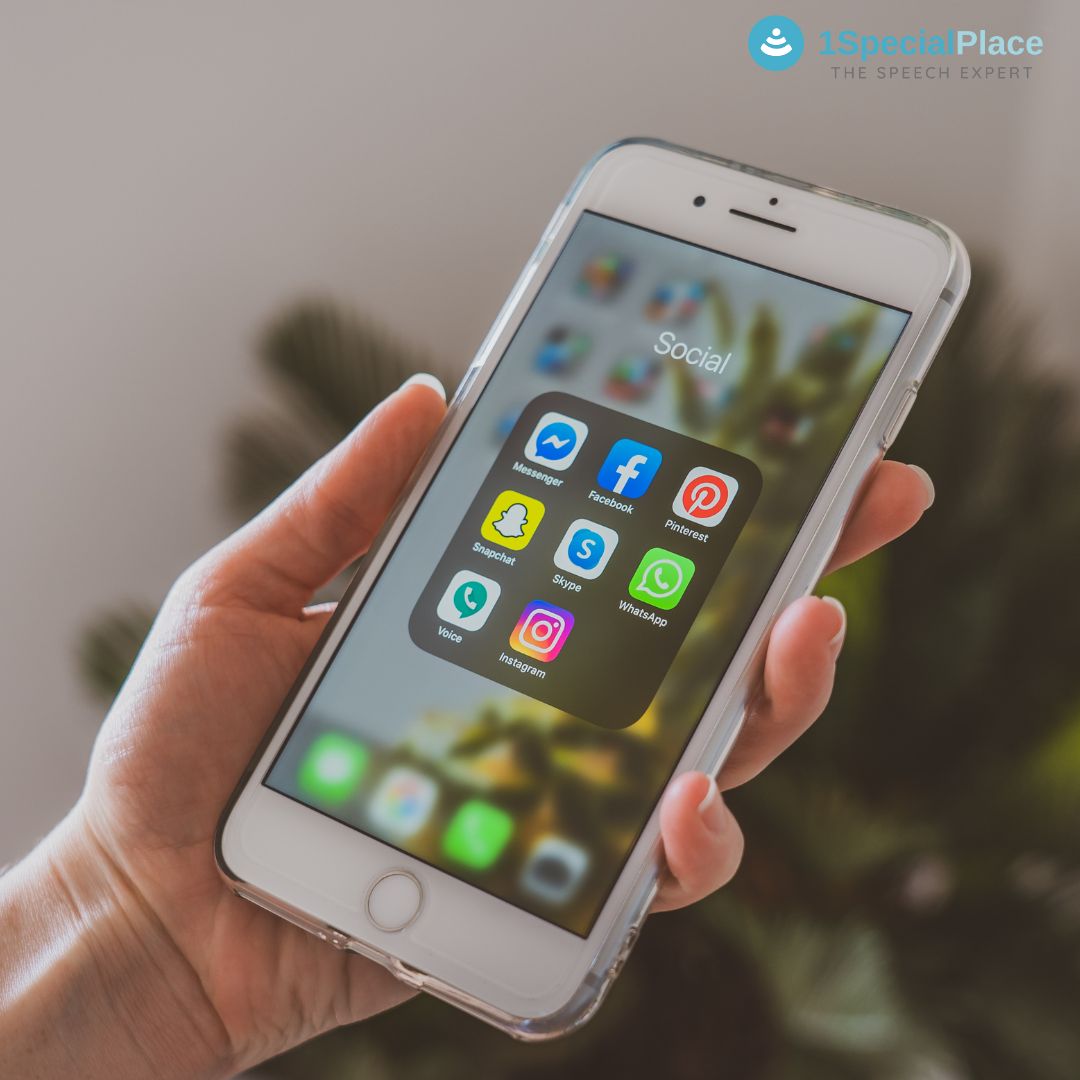
Amazing Apps for Speech therapy
Amazing Apps for Speech therapy
Amazing Apps for Speech therapy, Over the past years, apps for computers, tablets, and smartphones have proven to be effective tools in speech therapy for children. Many speech Therapists report that many children enjoy working with apps. This facilitates the learning process. Another significant benefit of Amazing Apps for Speech therapy is that they’re affordable and offer an easily accessible way for children to practice at home.
Considering the fact that the frequency of practice and the quality of the guidance is critical to progress, apps have the potential to greatly increase and speed up children’s development. For parents who do not have the budget or time to bring their children to a Speech Language Therapist every day, utilizing the best apps for speech therapy provides a distinct advantage.
What’s more, practicing in the safety of their own home with only their family or caregivers around them can make children feel more at ease. Factors such as a comfortable place and being surrounded by people they know will contribute to better performance.
Since there are so many apps out there, it can be confusing to know which ones are effective and which aren’t. That’s why we have selected some of the best speech therapy apps with kids in mind.
Why use apps in speech therapy?
According to the American Speech-Language-Hearing Association (ASHA), using mobile devices and apps with children can offer some advantages. Children often enjoy using them, which helps to keep them motivated.
Some speech therapy apps are most appropriately used in the educational setting, while others can be incorporated into the clinical therapy setting and/or used at home to reinforce therapy goals. And some can be used by speech-language pathologists (SLPs) to track a patient’s progress.
For example, SLP Progress Monitoring is an app for Android devices that helps the SLP user gather data and track students’ progress.
Assessment:
Speech Doctor: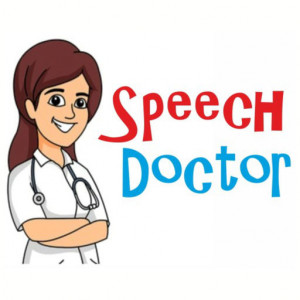
Speech Doctor is an app that assists parents and speech therapists alike in identification of speech related disorders in kids at an early stage. Through the app, a parent or doctor can get a fair idea of whether the child under his/her care needs special speech and language enrichment. Features include:
- Register and track multiple kids
- Test both Receptive and Expressive Language skills
- Get test results in easy to understand colour-coded format
- Get results mailed to your Email address automatically. Share results via Email/Whatsapp
- Get intelligent recommendations based on test results
- Take any number of tests
- See previous test results and compare them easily
Speech and Language: These apps help to improve comprehension, vocabulary and understanding
-
Let’s Use Language:
One of several apps offered by Everyday Speech, this app focuses on literary-based language development. It uses 10 stories to teach the language concepts of vocabulary, sequencing, categories and opposites, including 40 total lessons. Expanded Pro version also available.
-
ABC Food:
This fun app can help children learn how to use descriptive language. It teaches new words through sight, sound and touch, incorporating food-related pictures, sounds, videos and interactive games. Or check out Peapod Labs’ other ABC apps such as ABC Bugs, ABC Wildlife, ABC Music and more.
The app is one of the few to provide first words for babies in Hindi and Kannada apart from English, Spanish, Italian and German. This will enable kids to learn their first words in their native languages. Additionally, if your child is a fast learner, simply switch the language and boost his speaking skills further.
This app by makes learning for your child fun and exciting. It will help your child learn his/her first 50 words easily and in no time they will be knowing more words than you. The app provides a multitude of features that make learning fun for the kid while allowing the parents to assess the progress of their child :
- Kids can swipe through flashcards to practice words, their pronunciation and spellings.
- As a parent you can test and assess their progress, in the Auditory Identification, where words appear randomly and your kid has to identify the correct corresponding image
- You can mark words that the child has difficulty with and help him/her concentrate on these.
- You can see how quickly your child is able to identify the words by selecting Auto in Auditory Identification. The time taken by the child as he/she identifies the correct image will be recorded in the background.
- Share the progress report of your child by clicking the Share button via Email, WhatsApp etc.
The second part in this series of Early Word apps and continue your child’s progress in learning his/her first words. As with the previous app, there are a multitude of features that make learning fun for the kid while allowing the parents to assess the progress of their child
-
Language Therapy 4 in 1
Developer: Tactus Therapy Solutions Ltd.
The full app includes over 700 core nouns, verbs, and adjectives, thousands of exercises and activities, as well as recommendations on what to focus on next based on the clients’ scores. The 4 areas include: Comprehension (understanding spoken language), Naming (to strengthen word-finding skills), Reading (addressing literacy skills), and Writing (addressing spelling skills)
Amazing Apps for Speech therapy
-
Conversation Therapy
Developer: Tactus Therapy Solutions Ltd.
Ideal for children aged nine and older, this app gives therapists more than 3,000 questions to use as prompts, helping students aiming to make progress in expressive language, pragmatics, problem-solving and cognitive communication. Individual and group therapy is customizable, with individual goal tracking and reporting available.
-
Keyword Understanding
Developer: Aptus Speech & Language Therapy Ltd
A receptive language app, Keyword Understanding helps children experiencing auditory processing difficulties, receptive language disorder, Autism Spectrum Disorders and reduced attention. Therapists have the ability to facilitate learning in auditory mode, text mode, or both.
-
Word Vault / Word Vault Pro
Developer: Home Speech Home
This app is designed for both children and adults. You can access audio and high-definition images for 8100 words, 1800 phrases & sentences, and 115 stories to address articulation and language skills. This includes real-world photos for over 3800 minimal pairs as well as almost 300 multi-syllabic words. There are over 120 categories for language building and over 25 social language categories. Interactive materials found with the Pro version are located in the Phonology, Language, and Social Vaults. You are able to create individual or group files to track the data of your clients.
Amazing Apps for Speech therapy
Developer: IDC School of Design at the Indian Institute of Technology Bombay, Mumbai.
This is a friendly Augmentative and Alternative Communication (AAC) solution that uses icons to aid communication in people learning to speak or with difficulty with speech and language. The easy-to-learn interface and visually appealing icons of Jellow make it is an ideal solution for beginner-level communicators.
A novel visual Emotional Language Protocol (ELP) was conceived in order to enhance the language ability of Jellow. ELP represents the 6 core expressive icons of the interface. Using these core buttons along with the central category buttons, the child can very easily communicate their likes, dislikes, and needs with others.
Jellow is a complete communication system conceived in the following variations to cater to the needs of users with a varying range of abilities:
- Jellow Book: Flash Cards, E-book/PDF Booklet
- Jellow Desktop Application: http://www.jellow.org/web/
- Jellow Mobile/Tablet: Android app now on Google Play store
- Jellow Input Devices: Switch Access
- Jellow Customized
Articulation: Children whose speech is impaired due to a physical issue such as a cleft palate or problems with the jaw can benefit from apps that help them practice articulation.
1. Speech Tutor
Speech Tutor is one of the best speech therapy apps to give a clear overview of what happens inside the mouth and throat during speech. It offers 132 animations depicting both a front view and a side view of the mouth so children have an accurate, visible example of how to create sounds. The animations allow users to “see through” parts of the mouth that have been made transparent, with a side view and a front view of each sound production. Animations can be viewed at three different speeds, and paused at any point
-
ArtikPix
This articulation app enables children to practice their speech using flashcard and matching activities. Collecting, saving and exporting time-stamped data (per student) is possible for individual sessions – and group therapy for up to four children at a time. The free version gives you “th,” “w,” “y,” and “h” decks; an additional 20 are available as an In-App purchase, with discounts available for all or multiple decks.
-
Speech FlipBook – Articulation & Apraxia
Developer: Tactus Therapy Solutions Ltd.
Therapists, teachers and parents alike can use this talking flipbook, which is customizable to individual student needs. Speech therapy practitioners can generate specific word lists – for example, focusing on all words that begin or end with a certain sound – and help students hear their progress using recording and playback features. The free version includes 16 sounds and 40 words, with the option to upgrade to more than 2,300 word recordings, 125 phonemes and clusters, all vowels and consonants, and more than 250 sets of homophones.
4. Articulation Station Pro
This app is a comprehensive tool for children with speech sound delays. It offers exercises to practice 22 sounds at both the word and sentence levels, as well as the longer story level.
It includes six activities:
- flashcards
- matching
- rotating sentences
- unique sentences
- level 1 stories
- level 2 stories
With colorful photos and a suite of tools including voice recording for auditory feedback, scoring, and data tracking, it’s easy to use by speech-language pathologists and parents alike.
5. TallyTots
One of the best speech therapy apps for toddlers who need help with verbs, two-word combinations, counting, and concepts. Described as action-packed, this is one of the engaging speech therapy apps for iPad users. It includes 20 awesome mini-games that help kids have fun with numbers.
This app features:
- 20 puzzles and mini-games that teach quantity, order, and sorting.
- An awesome sing-along counting song.
- An assisted counting guide that helps toddlers count all the way to 100.
6. Talking Pierre the Parrot
Talking Pierre the Parrot is a virtual pet who repeats everything your child says in a funny voice. Although this isn’t a dedicated speech therapy app, it’s a great way to motivate your child to articulate correctly so Pierre sounds good. This app is lots of fun for kids because it is less structured. Consider using this app as positive reinforcement after more intense sessions.
-
Articulation Station
Developer: Little Bee Speech
This free app can be used on iPad or iPhone and is designed to help children practice at the “word, sentence and story levels in 22 sounds in the English language.” It can be used by SLPs, parents and other educators to work with children and adults with speech sound delays. SLPs can use the app in both individual and group therapy sessions, facilitating the practice of 22 sounds and collecting data to help evaluate progress. Parents can find this useful for reinforcement of therapeutic goals at home.
Best Apps for Speech Therapy: Stuttering
1. Fluency SIS
Intended for school-age children who stutter, SIS (Smart Intervention Strategy) reshapes the approach to stuttering modification. Its goal is to help the child become an effective and confident communicator by desensitising him or her to feared stimuli, thereby reducing anxiety. Using creativity and humour, it teaches the child how to maintain a positive perception of him or herself.
2. Fluency Tracker
One of the best speech therapy apps for the parents of children who stutter and aims to increase children’s positive feelings about speech, as well as reduce avoidance behaviour. Users can enter data regarding how often the child stutters throughout the day, when and where this occurs, and with whom the child was speaking. They can also record when and why the child avoided speaking. This data is processed to provide an ongoing overview of a child’s anxiety and attitudes toward speaking so that the speech therapist can better customise his or her therapy
Speech Therapy Apps for Autism Spectrum Disorders
Children with autism spectrum disorders can experience difficulty learning language and acquiring basic conversational skills. The following apps can help.
1. Keyword Understanding
Aimed at enhancing comprehension in children with autism and special needs, this is one of the best apps for speech therapy with exercises to practice auditory and written instructions.
It has three modes:
- auditory only
- text only
- auditory and text
With an easy to use interface, colourful photos, and 3D objects, users can create thousands of “tasks” for the patient to perform.
For example, you can create the task, “Touch the flower,” and follow it up with, “Touch the vase.”
Eventually, when the child has mastered simple task comprehension, you can create the more complex task, “Touch the flower and then touch the vase.”
2. Let’s Be Social
This speech therapy app provides exercises to practice pragmatic language or social skills.
There are 40 lessons that are divided into five skill sets:
- personal interactions
- navigating the community
- school behaviour
- handling change
- social relationships
Lessons depict “normal” interactions and teach the patient what the expected emotions and behaviors are in that interaction. This is shown through a video with thought bubbles to reinforce learning.
Users can also create their own lessons thanks to the intuitive interface.
3. iSequence
iSequence is an educational app for children with Autism and Asperger’s Syndrome that enables them to practice 100 different sequences of everyday situations, such as:
- Autonomous habits like brushing their teeth, washing their hands, getting dressed or going to bed
- Fun activities like going to the beach, to the movies or do sports
- Everyday situations like falling down, taking the bus, going the doctor, buying bread or getting wet in the rain
- Emotions like happiness, sadness, surprise or fear
Talking along with the lead character in the app provide opportunities to practice speech.
-
SpeechBox for Articulation
This easy-to-use app was designed for children with autism, apraxia, and other speech language disorders. It is also appropriate for stroke patients. Includes over 700 engaging colorful pictures in 34 categories, plus professionally recorded word prompts; SLPs can also add their own word prompts and notes for targeted words.
The limits of speech therapy apps
When considering any speech therapy app to use in your SLP practice, it is important to remember that apps have their limits.
Even the most widely-used apps may not be appropriate for every patient or client. Some patients have very complex communication needs, and so there may be accessibility concerns. They may not be able to use an app on a mobile device due to certain limitations.
Depending on their particular needs, speech therapy patients may need another type of tool to help them communicate effectively with the world.
ASHA takes the position that a formal, team-based assistive technology assessment must first be conducted to determine the most appropriate device (and app) for an individual who needs augmentative assistive alternative communication (AAC).
- Birth – 1 Year : Speech & Language Milestones - December 22, 2022
- Amazing Apps for Speech therapy - October 1, 2018
- Childhood Apraxia of speech (CAS) - September 8, 2018

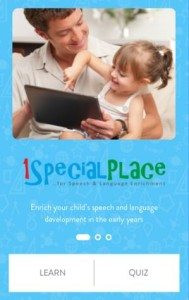
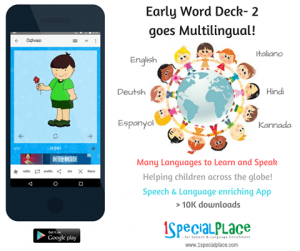
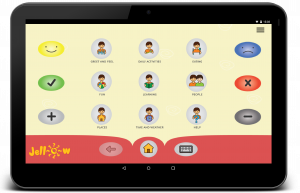
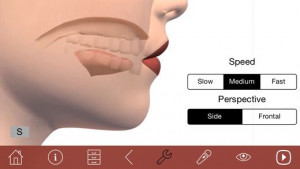
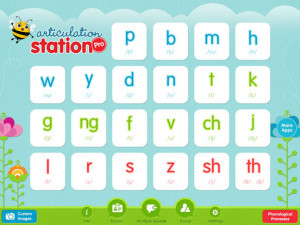

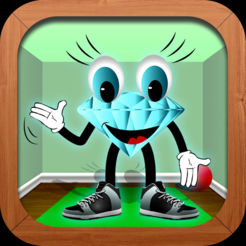
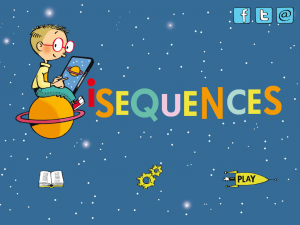
Leave a Comment
(2 Comments)
I can’t not make any sound
Hello Shanel
You can email us more about your concerns at info@1specialplace.com
We are happy to help you.
Categories
Recent Posts